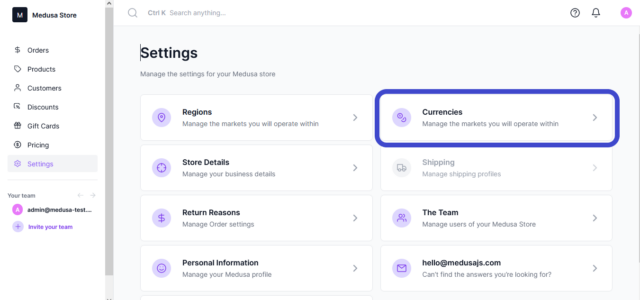Medusa is an open-source commerce platform built for digital commerce applications. It provides modularized commerce logic, allowing developers to create rich, reliable, and performant commerce websites, point-of-sale (POS) applications, B2B shops, and other commerce-enabled products.

Here are some key points about Medusa:
- Building Blocks for Commerce:
- Medusa offers foundational commerce building blocks, such as carts, products, and order management.
- These modules eliminate the need to build core commerce logic from scratch, allowing developers to focus on customizations.
- All modules are open-source and freely available on npm, giving you full control over your commerce stack
- Quick Development Cycles:
- Unlike other platforms, Medusa is designed for customization, keeping technical debt low and enabling fast development cycles.
- Your team can remain agile and responsive to business needs
- MIT Licensed and Open-Source:
- Medusa’s modules are MIT licensed, ensuring that you have complete control over your commerce stack.
- Say goodbye to unexpected API changes
- Continuous Improvement:
- Medusa ships new features and improvements weekly, providing better tools for developers.
- The roadmap is public, allowing transparency and community involvement
- Industry Adoption:
- Leading companies use Medusa’s building blocks for their custom commerce setups.

How does Medusa compare to other commerce platforms?
Let’s compare Medusa with some other popular commerce platforms:
- Woocommerce:
- Woocommerce is an open-source, customizable ecommerce platform built on WordPress.
- It offers features like flexible and secure payment and shipping integration.
- Written in PHP, Woocommerce allows you to build online stores using the familiar WordPress ecosystem.
- It aims to enable users to create an online store with just a few clicks and start selling.
- Pros of Woocommerce:
- Beginner-friendly: You don’t need to be an expert developer to use it.
- Abundant themes: Thousands of free and paid themes available.
- Cons of Woocommerce:
- Tied to WordPress: Requires setting up a WordPress installation.
- Limited customization: Some features are limited to what the platform provides
- Shopify:
- Shopify is a fully-hosted, all-in-one solution with a proprietary codebase.
- It’s popular for its ease of use and comprehensive features.
- Pros of Shopify:
- Simplicity: Ideal for beginners and non-technical users.
- App ecosystem: Extensive app store for additional functionality.
- Cons of Shopify:
- Less customization: Limited flexibility compared to open-source platforms.
- Subscription costs: Monthly fees for using the platform2.
- Medusa:
- Medusa is a JavaScript-based open-source tool for building online stores.
- Launched in 2021, it’s gaining popularity due to its customization abilities.
- Pros of Medusa:
- Customization: Offers greater flexibility and control over your store.
- Out-of-the-box features: Multi-currency support, plugin integration, tax configurations, and more.
- Return Merchandise Authorization (RMA) flows: Ideal for handling returns.
- Cons of Medusa:
- Newer platform: Still evolving compared to established solutions.
- Requires development expertise: More suitable for developers
Well, what are examples of companies using Medusa?
Medusa is gaining traction among global enterprises and fast-moving startups. Here are some examples of companies and ventures that utilize Medusa’s open-source commerce modules and tools:
- SMARTTechStack: This company incorporates Medusa’s building blocks to create robust commerce applications. Their use case demonstrates how Medusa’s modularized logic enables reliable and performant commerce experiences
- Eyloo GmbH: Eyloo GmbH leverages Medusa for its commerce-enabled products. By using Medusa’s modules, they can focus on customizations and avoid reinventing core commerce logic.
- EBSCOIS: Another company benefiting from Medusa’s capabilities. Medusa’s flexibility allows them to build tailored commerce solutions that meet their specific requirements
- Catalog: Catalog, a French-based venture-backed startup founded in 2022, developed a B2B sales platform using Medusa’s commerce modules. Their SaaS solution enables SMBs to set up digital B2B channels that integrate directly with their ERP systems.
Conclusion
As you can see, Medusa is a popular ecommerce platform. Should you choose it for your next ecommerce venture? Let’s discuss.
If you’re interested in exploring Medusa further, you can start by setting up your own Medusa project and diving into its rich features!
In case of any questions we are glad to help
